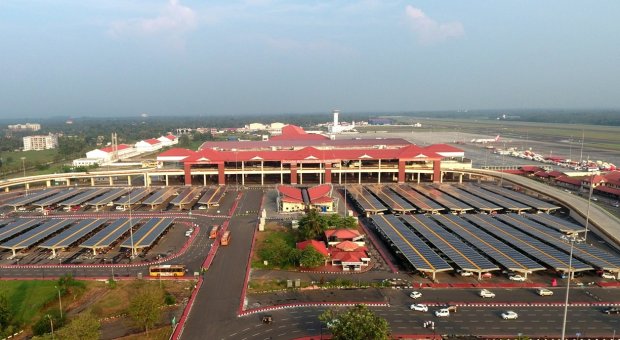How is the World’s first airport fully powered by Solar Energy faring over time

The Cochin International Airport has been a torchbearer from its inception on many accounts including the solar power project which prompted many other airports to move the solar way.
CIAL (Cochin International Airport Ltd) is the world’s first airport fully powered by solar energy. The Cochin International Airport has been a torchbearer from its inception on many accounts including the solar power project which prompted many other airports to move the solar way. The company keeps a close watch on how its interventions affect society and the world around. CIAL has always strictly adhered to the ideas of cost-effectiveness and sustainable development. A huge establishment like an airport requires a high volume of energy to operate upon. And by using green energy, CIAL hopes to contribute in its own way to a healthier and greener planet. One of this greenport’s innovations, which proved that relying on green energy is possible even for high-energy consumers like an airport, won CIAL the Champions of the Earth award instituted by the UN in 2018.
It is a rarity that airport operators tread into the business of green Energy Production. Aviation is one of the fields which is being reprimanded for the production of greenhouse gases.CIAL’s objective was not to offset airplane-related emissions at the airport but to take a small step towards powering the entire airport and allied facilities through solar energy and to send out a message to the world that a medium-sized airport can become self-sufficient on solar power. At this juncture, CIAL believes that it is company’s responsibility to venture into projects producing green energy and thereby reducing carbon footprints.
Green Energy Initiatives
CIAL has been trying to enhance green energy production since the inception of its first-ever solar project in 2013. And by 2015, CIAL, becomes the first airport in the world that completely operates on solar power comprising 46,150 solar panels laid across 45 acres near the cargo complex. CIAL’s solar power plant is producing 50,000 to 60,000 units of electricity per day to be consumed for all its operational functions, which technically makes the airport's power neutral. Now the airport operator have 8 plants near the premises of the airport having a cumulative capacity of 40 MW. More green initiatives are adding up to it.
A 12.5MW solar plant in Payyanur near Kannur District was commissioned in February 2022.The Plant is located at Kannur Dist., Payyannur Thaluk, Ettukudukka. This is a 12MWp DC capacity Ground Mounted Grid Connected Solar PV Plant. CIAL developed a concept of Terrain based Installation where the orientation and tilt of solar modules will be depended on the orientation and slope of the land area. Terrain-based installation increases the land utilization compared to flat land by decreasing the space between the Solar module arrays, which is not possible in flat land where the shadow of the front table (the table is an independent framework housing solar PV modules) will be cast on the rear one. Here due to the advantage of the slope of the land, inter-table shadow will not be cast. The land area required for solar PV installation is reduced to approximately 2.75 Acres /MW as compared to 3.75 Acres / MW in flat land. Therefore this plant could install 35% additional capacity from the land area as compared to typical flat ground South Oriented installation.
Tryst into Hydropower
On 06th November 2021, CIAL ventured into hydropower. The 4.5 MW Arippara power plant was commissioned with a total capacity of 4.5 MW.Being a run of the river project, CIAL SHP at Arippara works on limited storage of water causing no adverse effect on the environment.The Arippara SHEP is located in Iruvazhinji River. The site lies in Nellipoyil Village near Kodencheri in Kozhikode District at a distance of 45 km from Kozhikode City,Kerala.
Agri voltaic practices
In July 2021 CIAL scaled-up farming practice by incorporating the modern method of agri-voltaic procedure. CIAL has eight solar plants on the premises of the airport. The biggest one; near the cargo terminal has an area of 48 acres; of which 20 acres have been used for agri-voltaic practice. The farm has vegetables like Yam, Long yard bean, Drumstick, Mountain ginger, Turmeric, Cabbage, Cauliflower, and Green Chilli. Water used to clean solar photovoltaic panels will be used for irrigating the cultivation. These crops are expected to modify the micro-climates below PV modules in reducing the temperature which results in increasing their efficiency in power generation. Moreover, the crop coverage in between PV arrays will also check the erosion of soil and thus will reduce the dust load on the PV module. Another advantage is that the cultivation dampens the weed growth underneath the PV panel mounts.
Floating Solar Plants
The idea of Total sustainability management (TSM) in CIAL golf course where treated water from the sewage treatment plant of the airport is used for water harvesting with the help of 12 artificial lakes. The water from these lakes is used for irrigating the lawns of the golf course and now, with the installation of the floating power plants, it has leaped one more step forward in TSM. The company has introduced cost-effective high-density polyethylene floats; using French technology, upon which 1300 photovoltaic panels were mounted and laid over two artificial lakes located in the 130-acre CIAL golf course. The total installed capacity of this plants 416Kv.
FY 2020-21 has witnessed a headway in its trysts with the green energy initiatives, by achieving a cumulative production volume of 25 crore units; offsetting 1,60,000 metric tons of carbon emission. A cumulative installed capacity of 50 MWp of green energy contributes fairly to the cause of championing sustainable development. A comparison is here:
- It reduces the carbon footprint by 2,800 metric tons per year
- This is at par with the fresh air that we get by planting 46 lakh tree saplings for 10 years
- This is also equivalent to not burning 11.9 million litres of fossil fuels
- It is also roughly the same amount of fuel used by over 7000 cars every year.
CIAL frame sustainability as a practice that helps us to create a future that we’re excited about living in, it generate optimism about solving complex problems. Pair that with creative thinking, will have tangible outcomes that are positively disrupting the status quo and effecting change. The key here is for more people to adopt the tools of change, not just follow along with the trends, but be willing to do the work to understand what needs to change. CIAL’s vision is to focus on the opportunities which can make a real difference, and facilitate further action which helps our planet.


